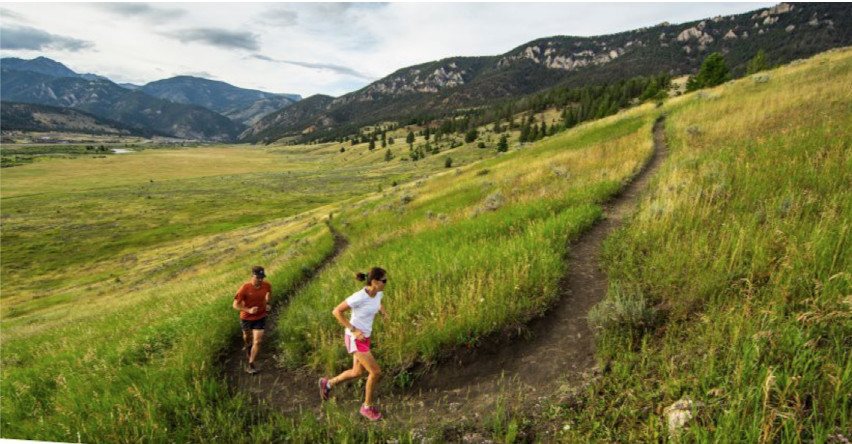Running News Daily
Running News Daily is edited by Bob Anderson. Send your news items to bob@mybestruns.com Advertising opportunities available. Train the Kenyan Way at KATA Kenya and Portugal owned and operated by Bob Anderson. Be sure to catch our movie A Long Run the movie KATA Running Camps and KATA Potato Farms - 31 now open in Kenya! https://kata.ke/
Index to Daily Posts · Sign Up For Updates · Run The World Feed
Running After 40: Time to Get Smart
As you get older, setting goals—and reaching them—will look a little different
Your forties: the decade when it all goes to hell. You get injured more. Your 5K time doubles. Recovery takes forever. At least that’s what everyone tells you will happen when you turn 40. And they’re (kind of) right. After 30, people can lose up to 5 percent of their muscle mass per decade, and VO2 max also tends to drop by 10 percent per decade. The result? Runners tend to get slower.

“You can expect to see a 1 percent decline in speed per year after you hit 40,” says Scott Murr, founder of the Furman Institute of Running and Scientific Training at Furman University. “And that assumes you’re training properly. If you’re not, you can expect bigger declines.”
But plenty of runners have been successful well into their forties, particularly endurance runners. “I was probably the most successful in my forties,” says Karl “Speedgoat” Meltzer, a professional ultrarunner best known for winning the most 100-mile trail races of any runner in history (38). But he wasn’t winning because he was becoming a faster runner as he aged. Instead he did it by running smarter. We’re not saying that by adhering to the following tips you’ll magically start winning 100s, but they will keep you running strong straight through your mid-life crisis years.
Welcome to the No Mistakes Zone
“Aging athletes have to adjust their expectations, otherwise they’ll get frustrated and potentially hurt,” Murr says. “I’m 57 years old. I can’t do what I could when I was 37 or 47. I can’t even run as fast as I could when I was 55.”
There are certain physiological truths that can’t be denied, but Pete Magill, a masters runner, coach and author of a series of books about running (including Build Your Running Body), says that training right can go a long way to improving performance as you age. “You can still do amazing things in your forties, but you have to do everything right,” Magill says. Loss of muscle mass, increasingly brittle connective tissue, and decreasingly dense bones are a recipe for injury. “When you enter your 40s, you’re in a no mistakes zone. You can’t go out the first day and run 30 minutes as fast as you can like you did when you were 20.”
Recover, Recover, and Recover Some More
The main reason masters runners get injured, according to Magill, is that they underestimate their need for downtime. “Our recovery requirements expand as we get older, and it’s hard for us to adjust,” Magill says. “We feel good and think we’re ready to run hard again, but feeling good is not a green light to push it.”
When you train hard too soon after a big day, you’re not giving your body the chance to finish rebuilding muscle, which is what makes you stronger and faster. “It takes more time than we think it does,” Magill says. “If you feel good two days after a hard run, wait a third day before doing a difficult workout again, otherwise eventually your body will break down.”
Meltzer didn’t start running ultras until he was 29 and he didn’t learn the importance of recovery until he was in his forties. “It took me a while, but I learned to run less and rest more,” Meltzer says.
But that doesn’t mean you should just sit on the couch. Magill says that runners need to adopt active rest—Meltzer, for example, gardens and hikes on down days. It also means incorporating mellower workouts into your training plan. “The trouble is that most runners turn every day into a medium day,” Magill says. “If you have difficult days, you have to have easy days. Most runners run their distance days faster than they need, which sabotages their hard workouts.”
Get Swole
Strength training will help combat that natural loss in muscle mass and bone density. Murr says there’s no one-size-fits-all formula for strength training, as long as you’re working all the major muscle groups.
Magill recommends a basic regiment that includes squats, deadlifts, and Nordic curls. It’s a program designed to strengthen your muscles in the way they’ll be used when you run to help prevent injury.
“The best way to get fit is to train without interruption, without taking breaks for injuries,” Magill says. “Injuries sideline your ability to improve. If you can go a few years without an injury break, something magical happens; your body begins to function in a way you never thought possible. Everything reaches a peak.”
Chill the F—k Out
Meltzer is proof that runners can stay successful in their forties and beyond, and he says he didn’t personally change his goals as he aged. He still wanted to run long distances and for a long time he wanted to win races. He coaches a lot of masters runners who come to him with lofty goals, which he says is fine as long as they keep their aging bodies in mind while training for those goals.
“You can only get so much out of your body, but if you treat it properly you’ll get the most out of it,” Meltzer says, adding that treating your body properly often means runners need to learn how to relax. “I developed a better attitude about running as I got older. I realized that I’m a better runner when I’m doing what I enjoy. I like to be in the mountains and run up 3,000 vertical feet, so that’s how I train.”
According to Meltzer, if masters runners need to change anything as they age, it’s in their mindset. Don’t be so hard on yourself. “Take it as it is. Enjoy it. Don’t get stressed about losing your speed in your forties,” he says. “Just enjoy what the decade brings you.”
by Outside Online
Login to leave a comment




